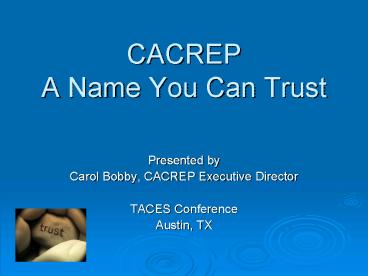CACREP A Name You Can Trust - PowerPoint PPT Presentation
1 / 16
Title:
CACREP A Name You Can Trust
Description:
... that provide the needed competencies to excel as a counseling professional ... Curriculum (diversity, addictions counseling, emergency preparedness, crisis ... – PowerPoint PPT presentation
Number of Views:138
Avg rating:3.0/5.0
Title: CACREP A Name You Can Trust
1
CACREPA Name You Can Trust
- Presented by
- Carol Bobby, CACREP Executive Director
- TACES Conference
- Austin, TX
2
The Agenda
- CACREPs Growth Curve
- 20/20 A Vision for the Future of the Counseling
Profession - Key elements of the 2009 CACREP Standards
- What makes a Program CACREP Equivalent?
- The Professions Dilemma
- Tackling the Pppppproblem(s)
3
Current Trends in CACREP Accredited Programs
4
20/20 The Seven Principles
- Sharing a common professional identity is
critical for counselors. - Presenting ourselves as a unified profession has
multiple benefits. - Working together to improve the public perception
of counseling and to advocate for professional
issues will strengthen the profession.
5
The Seven Principles (cont.)
- Creating a portability system for licensure will
benefit counselors and strengthen the counseling
profession. - Expanding and promoting our research base is
essential to the efficacy of professional
counselors and to the public perception of the
profession. - Focusing on students and prospective students is
necessary to ensure the ongoing health of the
counseling profession. - Promoting client welfare and advocating for the
populations we serve is a primary focus of the
counseling profession.
6
What Does it Really Mean to be CACREP Accredited?
- Steps for Programs
- The self-study process involves all aspects of
the programs curriculum and learning environment - Initial review by the Board
- On-site visit by peer experts
- Final Board Review
- Follow-up Reports
7
What Does it Really Mean to be CACREP Accredited?
- For our constituents
- Students receive a quality education that meets
or exceeds state standards - Clinical didactic experiences that provide the
needed competencies to excel as a counseling
professional - A streamlined application process for
certification licensure - Programs distinguish themselves from other
non-accredited programs, plus they get
cost-effective consultation - The profession has an accrediting body that
ensures continuity professional delivery of a
core set of required educational experiences
regardless of specialty emphases - Working toward reciprocity
- Clients benefit from receiving services from
counselors who have received the most
professional training
8
The Purposes of the 2009 CACREP Standards
- Given CACREPs proven benefits, the 2009
standards were written with an emphasis on - Maintaining relevance and excellence in counselor
preparation - Defining necessary aspects of the learning
environment - Developing strong counselor identity for
graduates through faculty role modeling,
professional development activities, and the core
curriculum. - Linking knowledge of theory to practice through
skill development and clinical experiences.
9
Select 2009 Standards
- Core Curriculum (diversity, addictions
counseling, emergency preparedness, crisis
intervention, suicide prevention models) - Faculty Issues (professional identity, core vs.
non-core, sufficiency in number, program
leadership, FTE ratios)
10
Select 2009 Standards (contd)
- Clinical Standards (practicum sites, supervision
contracts, direct service with real clients,
requirements for taping, 600 hour internship in
all areas) - Program Evaluation (continuous systematic)
- Student Learning Outcomes (program area
standards knowledge, skills and practices
comprehensive assessment plan)
11
So what is a CACREP-equivalent program?
- Is there really such a thing?
12
Concerns about Equivalencies
- Is misunderstood by current prospective
students - Is misleading to the public
- Is usually based on a paper review of the hours
required to - Complete clinical experiences
- Obtain the degree
- Creates differing pathways (i.e. non-regulated)
for entry into the profession - Interferes with licensure portability
- Contributes to a continued lack of clarity
regarding the professional identity of counselors
13
The Professions Dilemma
- Use of unclear indicators to determine and
validate professional identity of counselors. - Systemic challenges in defining the profession of
counseling - ACA uses work role
- Licensure boards allow for equivalencies
- One-way relationships with other professions in
terms of employment opportunities
14
Why and How Should TACES Members Help?
PpPpP
- Professional Identity improvement
- Public recognition
- Portability and reciprocity
- Public protection
- Partnering with CACREP
15
Tackling the Problem
- Brainstorm with CACREP on how to approach these
concerns. - Some states mandate accrediting reviews for any
higher education program that has a professional
component with a corresponding accreditor. - Determine for yourself where CACREP fits into
meeting the 20/20 principles, into facilitating
portability of credentials, and into clarifying
the publics understanding of the counseling
profession.
16
For more information
- Contact CACREP
- cacrep_at_cacrep.org
- Phone
- (703) 535-5990































